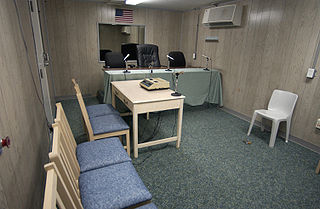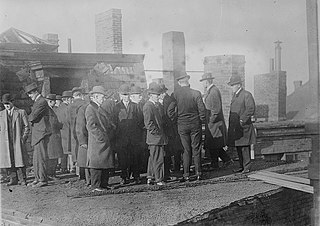In legal terminology, a complaint is any formal legal document that sets out the facts and legal reasons that the filing party or parties believes are sufficient to support a claim against the party or parties against whom the claim is brought that entitles the plaintiff(s) to a remedy. For example, the Federal Rules of Civil Procedure (FRCP) that govern civil litigation in United States courts provide that a civil action is commenced with the filing or service of a pleading called a complaint. Civil court rules in states that have incorporated the Federal Rules of Civil Procedure use the same term for the same pleading.
The insanity defense, also known as the mental disorder defense, is an affirmative defense by excuse in a criminal case, arguing that the defendant is not responsible for their actions due to a psychiatric disease at the time of the criminal act. This is contrasted with an excuse of provocation, in which the defendant is responsible, but the responsibility is lessened due to a temporary mental state. It is also contrasted with a finding that a defendant cannot stand trial in a criminal case because a mental disease prevents them from effectively assisting counsel, from a civil finding in trusts and estates where a will is nullified because it was made when a mental disorder prevented a testator from recognizing the natural objects of their bounty, and from involuntary civil commitment to a mental institution, when anyone is found to be gravely disabled or to be a danger to themself or to others.
Procedural law, adjective law, in some jurisdictions referred to as remedial law, or rules of court, comprises the rules by which a court hears and determines what happens in civil, lawsuit, criminal or administrative proceedings. The rules are designed to ensure a fair and consistent application of due process or fundamental justice to all cases that come before a court.
A deposition in the law of the United States, or examination for discovery in the law of Canada, involves the taking of sworn, out-of-court oral testimony of a witness that may be reduced to a written transcript for later use in court or for discovery purposes. Depositions are commonly used in litigation in the United States and Canada. They are almost always conducted outside court by the lawyers themselves, with no judge present to supervise the examination.
Mandamus is a judicial remedy in the form of an order from a court to any government, subordinate court, corporation, or public authority, to do some specific act which that body is obliged under law to do, and which is in the nature of public duty, and in certain cases one of a statutory duty. It cannot be issued to compel an authority to do something against statutory provision. For example, it cannot be used to force a lower court to take a specific action on applications that have been made, but if the court refuses to rule one way or the other then a mandamus can be used to order the court to rule on the applications.
The right to silence is a legal principle which guarantees any individual the right to refuse to answer questions from law enforcement officers or court officials. It is a legal right recognized, explicitly or by convention, in many of the world's legal systems.
Service of process is the procedure by which a party to a lawsuit gives an appropriate notice of initial legal action to another party, court, or administrative body in an effort to exercise jurisdiction over that person so as to force that person to respond to the proceeding before the court, body, or other tribunal.

Discovery, in the law of common law jurisdictions, is a pre-trial procedure in a lawsuit in which each party, through the law of civil procedure, can obtain evidence from the other party or parties by means of discovery devices such as interrogatories, requests for production of documents, requests for admissions and depositions. Discovery can be obtained from non-parties using subpoenas. When a discovery request is objected to, the requesting party may seek the assistance of the court by filing a motion to compel discovery.

The Guantanamo military commissions were established by President George W. Bush – through a military order – on November 13, 2001, to try certain non-citizen terrorism suspects at the Guantanamo Bay prison. To date, there have been a total of eight convictions in the military commissions, six through plea agreements with the defendants. Several of the eight convictions have been overturned in whole or in part on appeal, mostly by U.S. federal courts.
Nolle prosequi, abbreviated nol or nolle pros, is legal Latin meaning "to be unwilling to pursue". It is a type of prosecutorial discretion in common law, used for prosecutors' declarations that they are voluntarily ending a criminal case before trial or before a verdict is rendered; it is a kind of motion to dismiss and contrasts with an involuntary dismissal.
The Federal Rules of Civil Procedure govern civil procedure in United States district courts. The FRCP are promulgated by the United States Supreme Court pursuant to the Rules Enabling Act, and then the United States Congress has seven months to veto the rules promulgated or they become part of the FRCP. The Court's modifications to the rules are usually based upon recommendations from the Judicial Conference of the United States, the federal judiciary's internal policy-making body.
Forum non conveniens (FNC) is a mostly common law legal doctrine through which a court acknowledges that another forum or court where the case might have been brought is a more appropriate venue for a legal case, and transfers the case to such a forum. A change of venue might be ordered, for example, to transfer a case to a jurisdiction within which an accident or incident underlying the litigation occurred and where all the witnesses reside.

The Combatant Status Review Tribunals (CSRT) were a set of tribunals for confirming whether detainees held by the United States at the Guantanamo Bay detention camp had been correctly designated as "enemy combatants". The CSRTs were established July 7, 2004 by order of U.S. Deputy Secretary of Defense Paul Wolfowitz after U.S. Supreme Court rulings in Hamdi v. Rumsfeld and Rasul v. Bush and were coordinated through the Office for the Administrative Review of the Detention of Enemy Combatants.
Default judgment is a binding judgment in favor of either party based on some failure to take action by the other party. Most often, it is a judgment in favor of a plaintiff when the defendant has not responded to a summons or has failed to appear before a court of law. The failure to take action is the default. The default judgment is the relief requested in the party's original petition.
Bifurcation is a judge's ability in law to divide a trial into two parts so as to render a judgment on a set of legal issues without looking at all aspects. Frequently, civil cases are bifurcated into separate liability and damages proceedings. Criminal trials are also often bifurcated into guilt and sentencing phases, especially in capital cases.

Notice is the legal concept describing a requirement that a party be aware of legal process affecting their rights, obligations or duties. There are several types of notice: public notice, actual notice, constructive notice.
A subpoena ad testificandum is a court summons to appear and give oral testimony for use at a hearing or trial. The use of a writ for purposes of compelling testimony originated in the ecclesiastical courts of Church during the High Middle Ages, especially in England. The use of the subpoena writ was gradually adopted over time by civil and criminal courts in England and the European continent.
The legal system of South Korea is a civil law system that has its basis in the Constitution of the Republic of Korea. The Court Organization Act, which was passed into law on 26 September 1949, officially created a three-tiered, independent judicial system. The revised Constitution of 1987 codified judicial independence in Article 103, which states that, "Judges rule independently according to their conscience and in conformity with the Constitution and the law." The 1987 rewrite also established the Constitutional Court, the first time that South Korea had an active body for constitutional review.
Dennis Jacobs is a senior United States circuit judge of the United States Court of Appeals for the Second Circuit.

Grand juries in the United States are groups of citizens empowered by United States federal or state law to conduct legal proceedings, chiefly investigating potential criminal conduct and determining whether criminal charges should be brought. The grand jury originated under the law of England and spread through colonization to other jurisdictions as part of the common law. Today, however, the United States is one of only two jurisdictions, along with Liberia, that continues to use the grand jury to screen criminal indictments.




